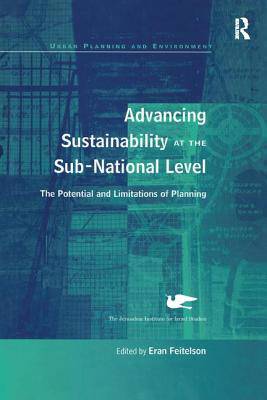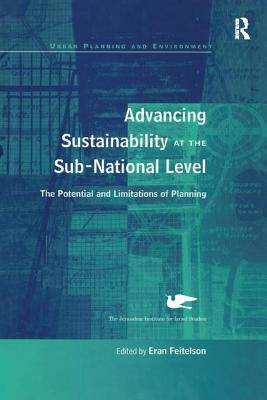
Door een staking bij bpost kan je online bestelling op dit moment iets langer onderweg zijn dan voorzien. Dringend iets nodig? Onze winkels ontvangen jou met open armen!
- Afhalen na 1 uur in een winkel met voorraad
- Gratis thuislevering in België vanaf € 30
- Ruim aanbod met 7 miljoen producten
Door een staking bij bpost kan je online bestelling op dit moment iets langer onderweg zijn dan voorzien. Dringend iets nodig? Onze winkels ontvangen jou met open armen!
- Afhalen na 1 uur in een winkel met voorraad
- Gratis thuislevering in België vanaf € 30
- Ruim aanbod met 7 miljoen producten
Zoeken
Advancing Sustainability at the Sub-National Level
The Potential and Limitations of Planning
€ 67,95
+ 135 punten
Omschrijving
Sustainability notions have been widely embraced by planners. However, the question of what can planners contribute to the advancement of such notions has not received much attention until now. This volume examines the potential contribution of planning to the advancement of sustainability at sub-national level, and the limitations it faces in doing so. Bringing together case studies from the US, UK, Poland, Israel, South Africa, The Netherlands and Italy, it covers a wide range of issues and contexts, ranging from the metropolitan to the community level. On the basis of these case studies, the book shows that planners do indeed have a variety of options to advance sustainability notions at these levels, and appear to be doing so. The book proposes that planners should operate at two levels: firstly to change institutional structures, and secondly to advance sustainability notions incrementally in the meantime, within the existing institutional constraints.
Specificaties
Betrokkenen
- Uitgeverij:
Inhoud
- Aantal bladzijden:
- 256
- Taal:
- Engels
- Reeks:
Eigenschappen
- Productcode (EAN):
- 9781138247901
- Verschijningsdatum:
- 16/05/2017
- Uitvoering:
- Paperback
- Formaat:
- Trade paperback (VS)
- Afmetingen:
- 156 mm x 233 mm
- Gewicht:
- 467 g

Alleen bij Standaard Boekhandel
+ 135 punten op je klantenkaart van Standaard Boekhandel
Beoordelingen
We publiceren alleen reviews die voldoen aan de voorwaarden voor reviews. Bekijk onze voorwaarden voor reviews.










